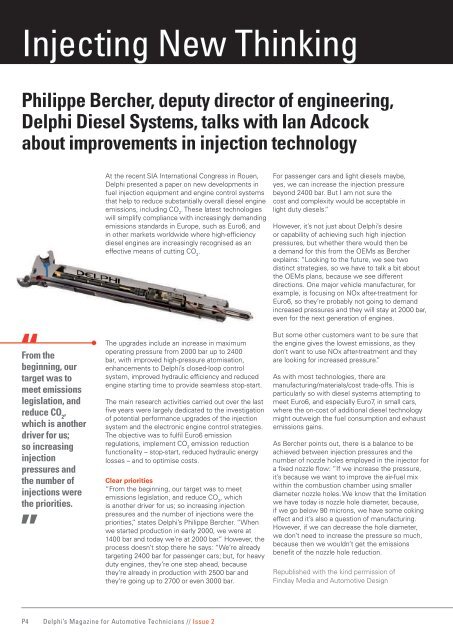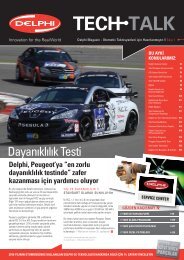Rally with Delphi - Delphi Aftermarket
Rally with Delphi - Delphi Aftermarket
Rally with Delphi - Delphi Aftermarket
You also want an ePaper? Increase the reach of your titles
YUMPU automatically turns print PDFs into web optimized ePapers that Google loves.
Injecting New Thinking<br />
Philippe Bercher, deputy director of engineering,<br />
<strong>Delphi</strong> Diesel Systems, talks <strong>with</strong> Ian Adcock<br />
about improvements in injection technology<br />
From the<br />
beginning, our<br />
target was to<br />
meet emissions<br />
legislation, and<br />
reduce CO 2<br />
,<br />
which is another<br />
driver for us;<br />
so increasing<br />
injection<br />
pressures and<br />
the number of<br />
injections were<br />
the priorities.<br />
At the recent SIA International Congress in Rouen,<br />
<strong>Delphi</strong> presented a paper on new developments in<br />
fuel injection equipment and engine control systems<br />
that help to reduce substantially overall diesel engine<br />
emissions, including CO 2<br />
. These latest technologies<br />
will simplify compliance <strong>with</strong> increasingly demanding<br />
emissions standards in Europe, such as Euro6, and<br />
in other markets worldwide where high-efficiency<br />
diesel engines are increasingly recognised as an<br />
effective means of cutting CO 2<br />
.<br />
The upgrades include an increase in maximum<br />
operating pressure from 2000 bar up to 2400<br />
bar, <strong>with</strong> improved high-pressure atomisation,<br />
enhancements to <strong>Delphi</strong>’s closed-loop control<br />
system, improved hydraulic efficiency and reduced<br />
engine starting time to provide seamless stop-start.<br />
The main research activities carried out over the last<br />
five years were largely dedicated to the investigation<br />
of potential performance upgrades of the injection<br />
system and the electronic engine control strategies.<br />
The objective was to fulfil Euro6 emission<br />
regulations, implement CO 2<br />
emission reduction<br />
functionality – stop-start, reduced hydraulic energy<br />
losses – and to optimise costs.<br />
Clear priorities<br />
“From the beginning, our target was to meet<br />
emissions legislation, and reduce CO 2<br />
, which<br />
is another driver for us; so increasing injection<br />
pressures and the number of injections were the<br />
priorities,” states <strong>Delphi</strong>’s Philippe Bercher. “When<br />
we started production in early 2000, we were at<br />
1400 bar and today we’re at 2000 bar.” However, the<br />
process doesn’t stop there he says: “We’re already<br />
targeting 2400 bar for passenger cars; but, for heavy<br />
duty engines, they’re one step ahead, because<br />
they’re already in production <strong>with</strong> 2500 bar and<br />
they’re going up to 2700 or even 3000 bar.<br />
For passenger cars and light diesels maybe,<br />
yes, we can increase the injection pressure<br />
beyond 2400 bar. But I am not sure the<br />
cost and complexity would be acceptable in<br />
light duty diesels.”<br />
However, it’s not just about <strong>Delphi</strong>’s desire<br />
or capability of achieving such high injection<br />
pressures, but whether there would then be<br />
a demand for this from the OEMs as Bercher<br />
explains: “Looking to the future, we see two<br />
distinct strategies, so we have to talk a bit about<br />
the OEMs plans, because we see different<br />
directions. One major vehicle manufacturer, for<br />
example, is focusing on NOx after-treatment for<br />
Euro6, so they’re probably not going to demand<br />
increased pressures and they will stay at 2000 bar,<br />
even for the next generation of engines.<br />
But some other customers want to be sure that<br />
the engine gives the lowest emissions, as they<br />
don’t want to use NOx after-treatment and they<br />
are looking for increased pressure.”<br />
As <strong>with</strong> most technologies, there are<br />
manufacturing/materials/cost trade-offs. This is<br />
particularly so <strong>with</strong> diesel systems attempting to<br />
meet Euro6, and especially Euro7, in small cars,<br />
where the on-cost of additional diesel technology<br />
might outweigh the fuel consumption and exhaust<br />
emissions gains.<br />
As Bercher points out, there is a balance to be<br />
achieved between injection pressures and the<br />
number of nozzle holes employed in the injector for<br />
a fixed nozzle flow: “If we increase the pressure,<br />
it’s because we want to improve the air-fuel mix<br />
<strong>with</strong>in the combustion chamber using smaller<br />
diameter nozzle holes. We know that the limitation<br />
we have today is nozzle hole diameter, because,<br />
if we go below 90 microns, we have some coking<br />
effect and it’s also a question of manufacturing.<br />
However, if we can decrease the hole diameter,<br />
we don’t need to increase the pressure so much,<br />
because then we wouldn’t get the emissions<br />
benefit of the nozzle hole reduction.<br />
Republished <strong>with</strong> the kind permission of<br />
Findlay Media and Automotive Design<br />
Technology challenges<br />
“Furthermore, there’s a limit to the number of<br />
holes, because the limit today is the hole diameter<br />
and, therefore, the number of holes you can put on<br />
the nozzle body. Currently, we are at eight to nine; if<br />
we go above that, you will not have enough material<br />
between the holes to <strong>with</strong>stand the pressure.” He<br />
admits that <strong>Delphi</strong> has tested a nozzle <strong>with</strong> more<br />
holes, but claims: “There’s no benefit so far.”<br />
The request for reduced tailpipe emissions<br />
is leading OEMs to develop ever more<br />
complex powertrain systems embracing<br />
combinations of technologies, such as<br />
electric assist motors and stop-start, both<br />
of which present Bercher and his team<br />
<strong>with</strong> their own challenges:<br />
“For stop-start, there are three main difficulties:<br />
the first concerns the pump, as it will have to<br />
tolerate more stop-starts than the conventional<br />
system. A customer may have a target of<br />
300,000-500,000 stop-starts in a vehicle’s<br />
lifetime; for a standard<br />
vehicle, <strong>with</strong>out stop-start,<br />
it’s maybe half of that. That<br />
means the pump has to be<br />
improved and be capable<br />
of doubling its normal<br />
service life, so that impacts<br />
the bearings in the pump.<br />
Secondly, as the injectors<br />
back leak time is needed to<br />
regenerate pressure.<br />
You could be forgiven for thinking that increasing rail<br />
pressure beyond 2000 bar would have a knock-on<br />
effect for other parts of the fuel delivery system –<br />
not so, says Bercher. “The big step was to move<br />
from the rotary pump at 500 bar and go to 1400-<br />
1500 bar; but today we know the manufacturing<br />
improvements we have to make, so we don’t see<br />
the same challenges“.<br />
For example, injectors on direct actuation,<br />
where there isn’t a return flow to the tank,<br />
when you stop the engine, pressure is<br />
maintained in the system, so it’s available to<br />
inject and fire the engine.<br />
“Finally, in terms of the engine<br />
management system (EMS), we<br />
can develop a strategy to ensure<br />
the engine is in a given position<br />
when it is stopped, so that, when<br />
it restarts, the EMS knows what<br />
state the engine is in, in order to<br />
quickly manage the injection. For<br />
the electric-diesel hybrids, it’s a bit<br />
different as the ratio of stop-starts<br />
is something like three times<br />
greater,” he adds. TT<br />
<strong>Delphi</strong>’s global network of highly equipped, highly skilled diesel specialists offers professional,<br />
cost-effective diagnostics, test and repair of today’s and tomorrow’s most advanced diesel fuel<br />
injection technology. They have invested in the very latest test equipment, tooling, standards,<br />
skills and knowledge and are backed by a leading OE manufacturer. To locate your nearest<br />
<strong>Delphi</strong> Diesel Centre, visit delphi.com/am.<br />
If we increase<br />
the pressure, it’s<br />
because we want<br />
to improve the<br />
air-fuel mix <strong>with</strong>in<br />
the combustion<br />
chamber using<br />
smaller diameter<br />
nozzle holes.<br />
P4 <strong>Delphi</strong>’s Magazine for Automotive Technicians // Issue 2 <strong>Delphi</strong>.com/am<br />
P5













